GoLang


VS
NodeJS


Why Go over Node?
Adaptibility measure
- Performance perspective
- Development perspective
- Deployment perspective
Performance
Comparing http servers
Specifications
Memory 7.7 GiB
Processor Intel® Core™ i5-6500 CPU @ 3.20GHz × 4
OS type 64-bit
Disk 483.8 GB

v8.11.3

go1.9
100000 Requests
100 Concurrent
Apache Benchmark

package main
import (
"fmt"
"log"
"net/http"
)
func handler(w http.ResponseWriter, r *http.Request) {
fmt.Fprintf(w, "GOLANG!")
}
func main() {
http.Handle("/", handler)
log.Fatal(http.ListenAndServe(":8080", nil))
}GoLang
const http = require('http');
function requestHandler = (request, response) => {
response.end('NODEJS!')
}
const server = http.createServer(requestHandler);
server.listen(8081, (err) => {
if(err) {
console.log('something bad happened', err)
}
})NodeJS




17154
Requests/sec
30568
Requests/sec
30568/17154 = 1.78197505 times better to be precise
Lets be real and install some packages, right?
After all, we're developers.
npm install express -S
go get -u gorilla/mux


const express = require('express');
const app = express();
app.get('/hello', (request, response) => {
response.send('NODEJS!')
});
app.listen(8081);NodeJS with ExpressJS
package main
import (
"fmt"
"log"
"net/http"
"gorilla/mux"
)
func HelloHandler(w http.ResponseWriter, r *http.Request) {
fmt.Fprintf(w, "GOLANG!")
}
func main() {
r := mux.NewRouter()
r.HandleFunc("/hello", HelloHandler)
log.Fatal(http.ListenAndServe(":8080", r));
}GoLang with Mux



10290
Requests/sec
30440
Requests/sec
30440/10290 = 2.95821186 times better to be precise
Lets do some work
Hashing
const http = require('http');
const crypto = require('crypto');
const requestHandler = (request, response) => {
for(let i =0 ; i <= 100; i++) {
crypto.createHash('sha256')
.update("123456789")
.digest("hex");
}
response.end("");
}
const server = http.createServer(requestHandler)
server.listen(8081, (err) => {
if (err) {
return console.log('something bad happened', err);
}
});NodeJS
n=100
package main
import (
"crypto/sha256"
"fmt"
"log"
"net/http"
"github.com/gorilla/mux"
)
func helloHandler(w http.ResponseWriter, r *http.Request) {
for i := 0; i <= 1000; i++ {
h := sha256.New()
h.Write([]byte("123456789"))
fmt.Sprintf("%x", h.Sum(nil))
}
fmt.Fprintf(w, "")
}
func main() {
r := mux.NewRouter()
r.HandleFunc("/hello", helloHandler)
log.Fatal(http.ListenAndServe(":8080", r))
}
GoLang
n=1000
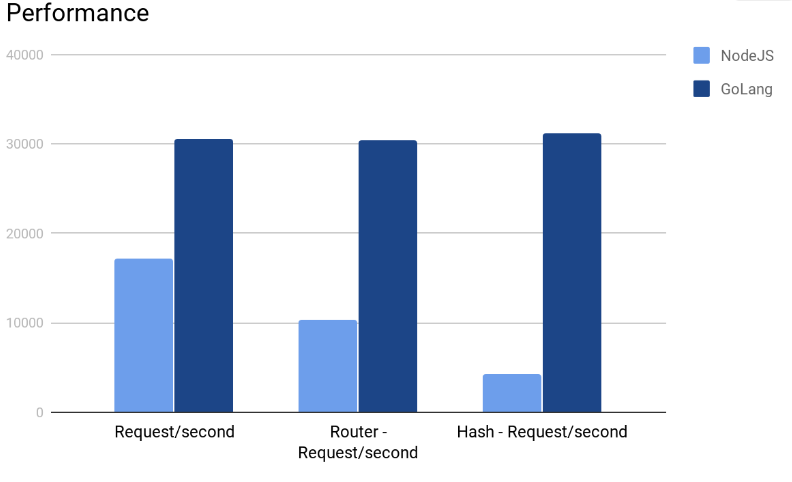

GoLang With Mux
Raw NodeJS


4329.21667
Requests/sec
31206.0567
Requests/sec
31206.0567/31206.0567 = 7.20824553 times better to be precise
{
"apps": [{
"name": "node",
"script": "./app.js",
"exec_mode": "cluster",
"instances": 4
}]
}PM2 Cluster Mode
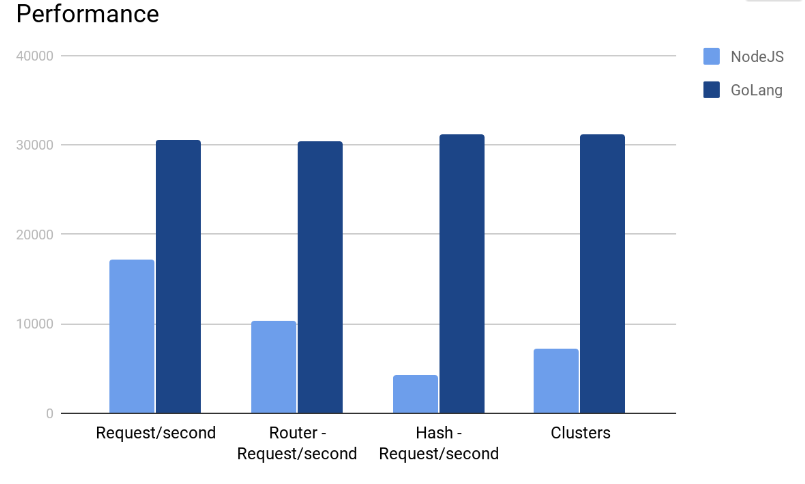


7213.67333
Requests/sec
31206.0567
Requests/sec
31206.0567/7213.67333 = 4.32595923 times better to be precise
Demystifying NodeJS and the Event Loop
NodeJS is single threaded, except its not.
NodeJS uses multi threading.
const crypto = require('crypto')
const NUM_REQ = 2;
for (let i = 0 ;i < NUM_REQ; i++) {
crypto.pbkdf2('secret', 'salt', 10000, 512, 'sha512')
}Sync crypto code.

https://www.youtube.com/watch?v=zphcsoSJMvM
The Node.js Event Loop: Not So Single Threaded
const crypto = require('crypto')
const NUM_REQ = 2;
for (let i = 0 ;i < NUM_REQ; i++) {
crypto.pbkdf2('secret', 'salt', 10000, 512, 'sha512', () => {})
}
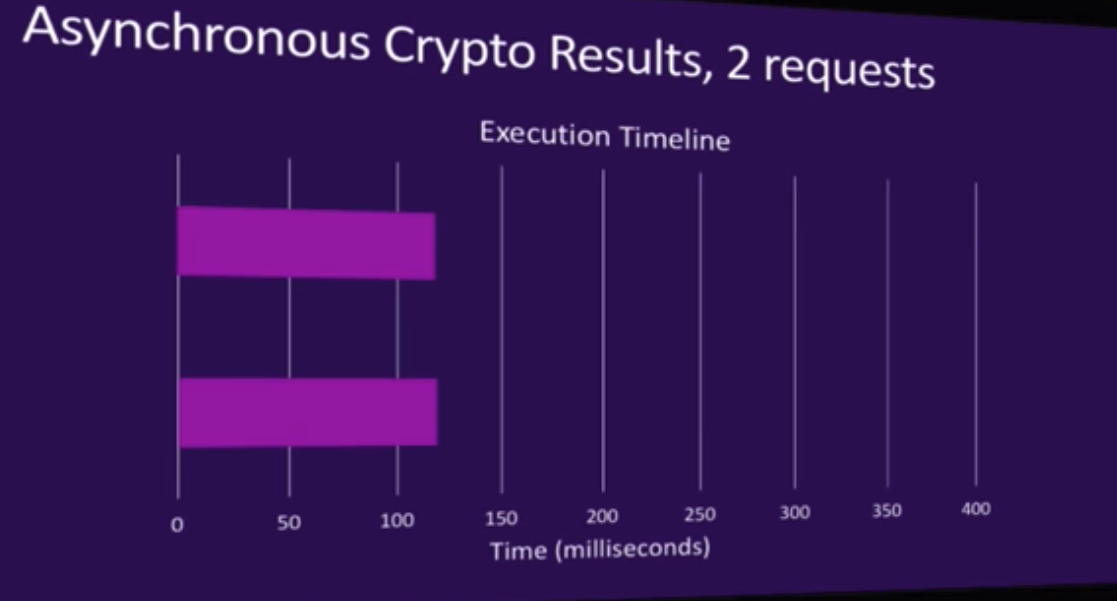
https://www.youtube.com/watch?v=zphcsoSJMvM
The Node.js Event Loop: Not So Single Threaded
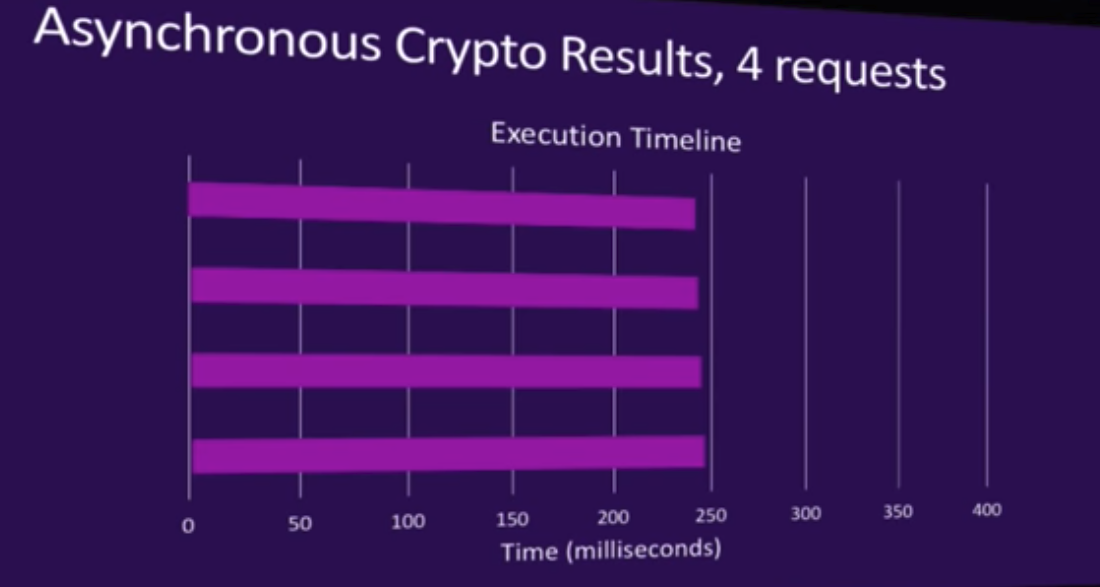
https://www.youtube.com/watch?v=zphcsoSJMvM
The Node.js Event Loop: Not So Single Threaded
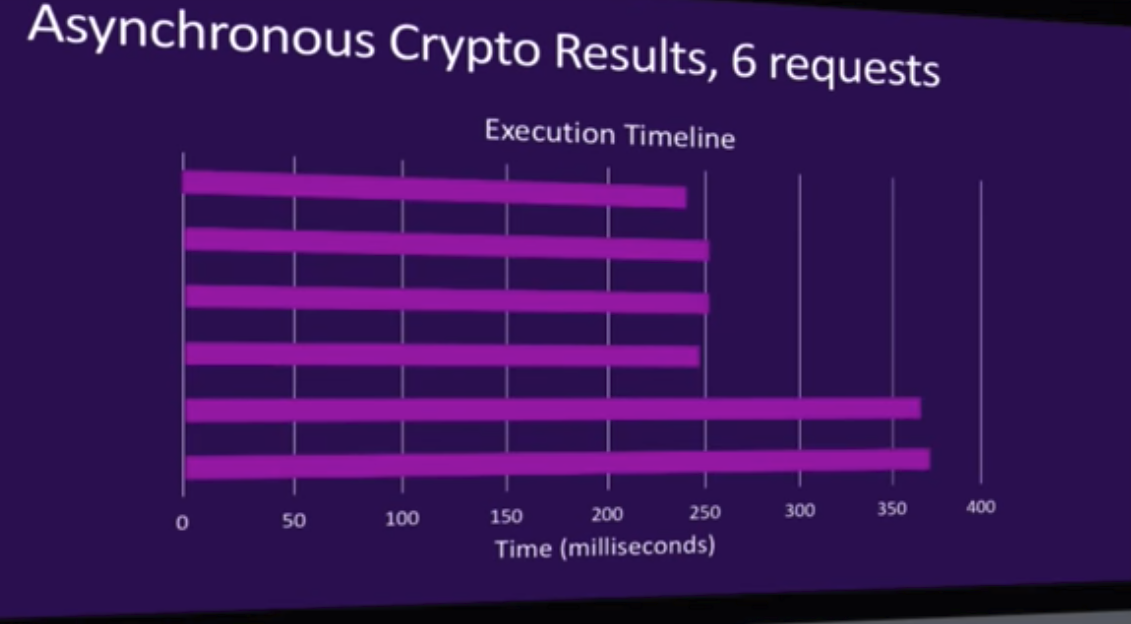
NodeJS uses a pre-allocated set of threads call the Thread pool (Default=4)
https://www.youtube.com/watch?v=zphcsoSJMvM
The Node.js Event Loop: Not So Single Threaded
How does GoLang do it?
Goroutines
What are Goroutines?
Runtime scheduler runs goroutines by mapping them onto operating system threads. Goroutines are lightweight version of threads, with very low cost of starting up.
https://www.youtube.com/watch?v=Yx6FBsGNOp4&t=215s
dotGO 2017 - JBD - Go's work stealing scheduler
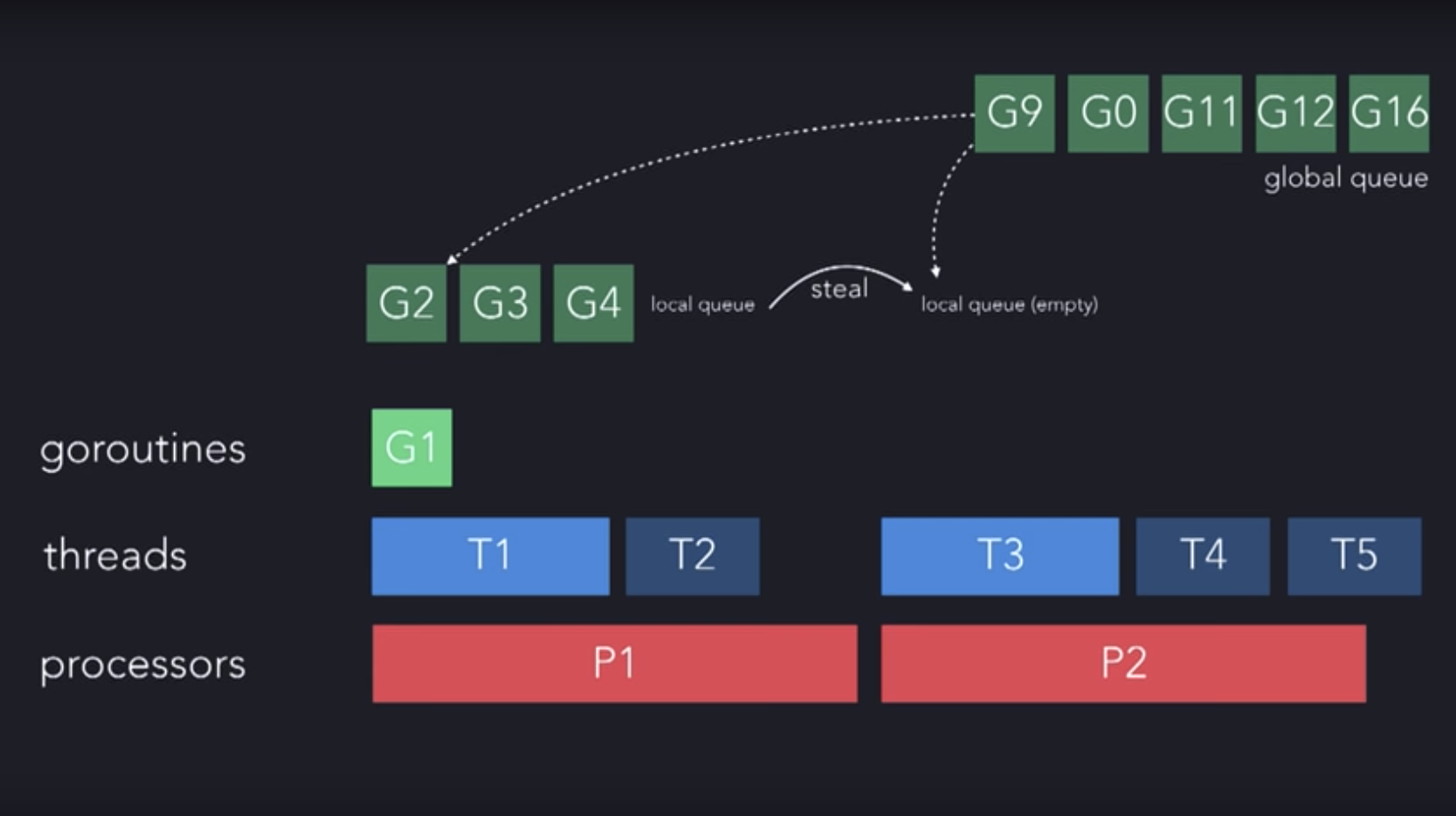
Developer Perspective

Amazing Community!

It's Javascript!
Rapid Prototyping
const app = require('express')();
app.post('/login', (req, res) => {
authService.login(req.body).then(
authToken => res.json({ Authorization: authToken })
);
})
app.listen(3000);If you really want it that way.
Whats so cool about Golang?

It's really really fast.
really fast.

Go concurrency model
Lightweight, concurrent function execution. You can spawn tons of these if needed and the Go runtime multiplexes them onto the configured number of CPUs/Threads as needed.
I left lorem ipsum here for fun.
Lorem ipsum dolor sit amet, consectetur adipiscing elit. Proin urna odio, aliquam vulputate faucibus id, elementum lobortis felis. Mauris urna dolor, placerat ac sagittis quis.
For concurrency, all you have to do is this.
f() go f()Its strictly typed.
It has a concept of implicit interfacing which is really awesome.
No whining for typescript anymore!
It has a Standard Library
sql, driver, strconv, fmt, log, net, net/http, json
you don't have to dig down the right package to get your job done.
It has ITS OWN LINT!
You don't have to worry about your lint versions or lintrc's anymore.
Channels
Complete control over your code.
Unlike the third promise in
Promise.all([p1, p2, p3])
Your whole application can be built into a single executable file.
Let it be Windows, Linux, or MacOS
Straight forward testing
No need for chai, mocha and weird named stuff.
Go has its own test suite.
Anonymous functions and Closures
func intSeq() func() int {
i := 0
return func() int {
i++
return i
}
}Deployment perspective
Your entire application as a single binary file.
Static Linking
Just push your binary over to the server and bash it!
Your server doesn't need Golang to run Golang on it. Forget about version issues.
Package Management through dep

Cloud Service Support for Go



Go Programming Language is a product baked at Google by the three greatest minds in the programming world. Considering the credentials Go showcases, it is not a shocker that many companies other than Google have adopted Go.
YouTube
Apple
Dropbox
Docker
Soundcloud
Mozilla Firefox
Medium
The New York Times
Github
UBER